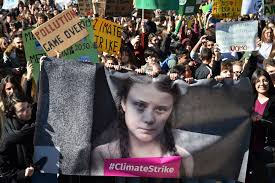We are all so aware of the heartfelt, courageous leadership Greta Thunberg has given in pressing for action from world leaders around climate change. That her actions and person have created pushback from adults raises massive questions about why late modern societies have created their own infantile anxieties around loss of power.
I was reflecting on this recently while in St John’s, Newfoundland participating for a few days with the Anglican Diocese of East Newfoundland and Labrador. It was my first time to this wonderful city and its people’s hospitality. Walking around the sea front and downtown I came across Broken Books. I always try to buy a book or two from a local independent. Among the mixed shelves I came across James Baldwin: The Last Interview and other Conversations (Melville House, 2014). It contained four interviews with Baldwin ranging from 1961 to 1987 the year he died. True confession: I was so encountered by Baldwin that I read the book at one go.
But what has Greta Thunberg to do with an African American who died long before she was born? To answer that a little bit of background for what must now be the majority of people who never heard of Baldwin (1924-1987). He was a novelist, essayists, playwright, social critical and prophetic voice. As an African American he was shaped by the Civil Rights movement but had left America to live first, in Istanbul and then in France from whence he made frequent trips back to America. What has always struck me about Baldwin was his incredible prescience. Even as far back as the early 60s he saw that the Western narrative was coming apart; he recognized that this would have incalculable effects on all peoples including the dominant white populations that felt so solidly in power. Much of what Baldwin wrote about is working itself out today.
The earliest interview in the book is with Studs Terkel. It took place in 1961. Terkel was seeking Baldwin’s reflections on the “Sit-in” that were then taking place across America but particularly in the South. Baldwin was becoming a well known African American social critic and Terkel wanted his take on what it meant that so many young people were involved in these movements for freedom, justice and equality for African Americans (in those days African Americans were still referred to as “Negroes” and that word moves all through Terkel’s interview with Baldwin). In responding to Terkel’s question about the way “youth” were leading the way in the early 60s Civil Rights movement, Baldwin said: Its easy for the country to sit in admiration before the sit-in students, because it doesn’t cost them anything. They have no idea what it costs those kids…This is a tremendous amount to demand of people…in a free country, which is supposed to be the leader of the West. It seems to me a great cowardice on the part of the public to expect that it is going to be saved by a handful of children, for whom they refuse to be responsible (page 18).
I wonder if we adults might be finding ourselves in a similar situation? As a small step in response and solidarity with our young people what about sitting down around a meal together with them – parents and grandparents to decide on practical actions we would do to participate with our young people in response to climate change! I don’t mean a march or demonstration, as important as these can be, but choosing simple, everyday tangible acts to take, for example, the use of our cars, our shopping habits, our use of plastic, the length of our showers. What about putting together such a table conversation around a meal to choose some acts, then come back together to share what happened, what was learned and what next steps there might be? If there is going to be action on climate change we adults have to step up not just applaud our young people but to act alongside them.
